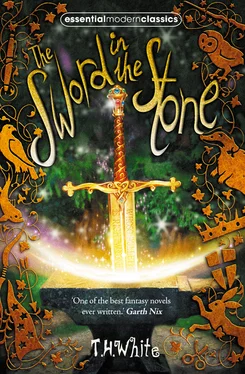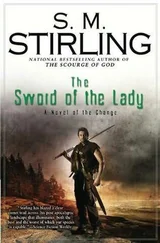In the afternoons the programme was: Mondays and Fridays, tilting and horsemanship; Tuesdays, hawking; Wednesdays, fencing; Thursdays, archery; Saturdays, the theory of chivalry, with the proper measures to be blown on all occasions, terminology of the chase and hunting etiquette. If you did the wrong thing at the mort or the undoing, for instance, you were bent over the body of the dead beast and smacked with the flat side of a sword. This was called being bladed. It was horseplay, a sort of joke like being shaved when crossing the line. Kay was not bladed, although he often went wrong.
After they had got rid of the governess, Sir Ector said, “After all, damn it all, we can’t have the boys runnin’ about all day like hooligans, after all, can we, damn it all? Ought to be havin’ a first-rate eddication, at their age. When I was their age I was doin’ all this Latin and stuff at five o’clock every mornin’. Happiest time of my life. Pass the port.”
Sir Grummore Grummursum, who was staying the night because he had been benighted out questin’ after a specially long run, said that when he was their age he was swished every mornin’ because he would go hawkin’ instead of learnin’. He attributed to this weakness the fact that he could never get beyond the Future Simple of Utor. It was a third of the way down the left-hand page, he said. He thought it was page ninety-seven. He passed the port.
Sir Ector said, “Had a good quest today?”
Sir Grummore said, “Oh, not so bad. Rattlin’ good day, in fact. Found a chap called Sir Bruce Saunce Pité choppin’ off a maiden’s head in Weedon Bushes, ran him to Mixbury Plantation in the Bicester, where he doubled back, and lost him in Wicken Wood. Must have been a good twenty-five miles as he ran.”
“A straight-necked ’un,” said Sir Ector.
“But about these boys and all this Latin and that,” added Sir Ector. “Amo, amas, you know, and runnin’ about like hooligans: what would you advise?”
“Ah,” said Sir Grummore, laying his finger by his nose and winking at the port, “that takes a deal of thinkin’ about, if you don’t mind my sayin’ so.”
“Don’t mind at all,” said Sir Ector. “Very kind of you to say anythin’. Much obliged, I’m sure. Help yourself to port.”
“Good port this,” said Sir Grummore.
“Get it from a friend of mine,” said Sir Ector.
“But about these boys,” said Sir Grummore. “How many of them are there, do you know?”
“Two,” said Sir Ector, “counting them both, that is.”
“Couldn’t send them to Eton, I suppose?” inquired Sir Grummore cautiously. “Long way and all that, we know.”
“Isn’t so much the distance,” said Sir Ector, “but that giant What’s-’is-name is in the way. Have to pass through his country, you understand.”
“What is his name?”
“Can’t recollect it at the moment, not for the life of me. Fellow that lives by the burbly water.”
“Ah, Galapas,” said Sir Grummore.
“That’s the very chap.”
“The only other thing,” said Sir Grummore, “is to have a tutor.”
“You mean a fellow who teaches you,” said Sir Ector wisely.
“That’s it,” said Sir Grummore. “A tutor, you know, a fellow who teaches you.”
“Have some more port,” said Sir Ector. “You need it after all this questin’.”
“Splendid day,” said Sir Grummore. “Only they never seem to kill nowadays. Run twenty-five miles and then mark to ground or lose him altogether. The worst is when you start a fresh quest.”
“We kill all our giants cubbin’,” said Sir Ector. “After that they give you a fine run, but get away.”
“Run out of scent,” said Sir Grummore, “I dare say. It’s always the same with these big giants in a big country. They run out of scent.”
“But even if you were to have a tutor,” said Sir Ector. “I don’t see how you would get him.”
“Advertise,” said Sir Grummore.
“I have advertised,” said Sir Ector. “I put it in the Humberland News and Cardoile Advertiser .”
“The only other way,” said Sir Grummore, “is to start a quest.”
“You mean a quest for a tutor,” explained Sir Ector.
“That’s it,” said Sir Grummore.
“Hic, Hac, Hoc,” said Sir Ector. “Have some more port.”
“Hunc,” said Sir Grummore.
So it was decided. When Sir Grummore Grummursum had gone away next day, Sir Ector tied a knot in his handkerchief to remember to start a quest for a tutor as soon as he had time, and, as he was not quite sure how to set about it, he told the boys what Sir Grummore had suggested and warned them not to be hooligans meanwhile. Then they went haymaking.
It was July, and every able-bodied man and woman on the estate worked all that month in the field, under Sir Ector’s direction. In any case the boys would have been excused from being eddicated just then.
Sir Ector’s castle stood in an enormous clearing in a still more enormous forest. It had a big green courtyard and a moat with pike in it. The moat was crossed by a strongly-fortified stone bridge which ended halfway across it: the other half was covered by a wooden drawbridge which was wound up every night. As soon as you had crossed the draw-bridge you were at the top of the village street – it had only one street – and this extended for about half a mile, with little white thatched houses of mud on either side of it. The street divided the clearing into two huge fields, that on the left being cultivated in hundreds of long narrow strips, while that on the right ran down to a little river and was used as pasture. Half of the right-hand field was fenced off for hay.
It was July, and real July weather, such as they only had in old England. Everybody went bright brown like Red Indians with startling teeth and flashing eyes. The dogs moved about with their tongues hanging out, or lay panting in bits of shade, while the farm horses sweated through their coats and flicked their tails and tried to kick the horseflies off their bellies with their great hind hoofs. In the pasture field the cows were on the gad, and could be seen galloping about with their tails in the air, which made Sir Ector angry.
Sir Ector stood on the top of a rick, whence he could see what everybody was doing, and shouted commands all over the two-hundred-acre field, and grew purple in the face. The best mowers mowed away in a line where the grass was still uncut, their scythes roaring all together in the strong sunlight. The women raked the dry hay together in long lines, with wooden rakes, and two boys with pitchforks followed up on either side of the line turning the hay inwards so that it lay well for picking up. Then the great carts followed, rumbling with their spiked wooden wheels, and drawn by horses or slow white oxen. One man stood on top of the cart to receive the hay and direct operations, while one man walked on either side picking up what the boys had prepared and throwing it to him with a fork. The cart was led down the lane between two lines of hay, and was loaded in strict rotation from the front poles to the back, the man on top calling out in a stern voice where he wanted each fork to be pitched. The loaders grumbled at the boys for not having laid the hay properly and threatened to tan them when they caught them, if they got left behind.
When the waggon was loaded, it was drawn to Sir Ector’s rick and pitched to him. It came up easily because it had been loaded systematically – not like modern hay – and Sir Ector scrambled about on top, getting in the way of the two assistants, who did all the real work, and stamping and perspiring and scratching about with his fork and trying to make the rick grow straight and shouting that it would all fall down as soon as the west winds came.
Читать дальше












